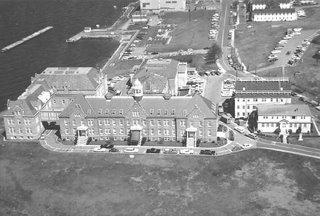
I received my doctorate from Princeton in 1981. In 1992-1993 I was lucky to have the opportunity to go back to school for a year at the United States Naval War College (NWC) in Newport, Rhode Island. I was in the College of Naval Warfare (sometimes called the "senior college" since it was comprised largely of Navy and Coast Guard Captains and Army, Air Force, and Marine Corps colonels with a smattering of upper mid-level civilians from various government agencies as well as a few commanders and lieutenant colonels).
The year's studies were divided into three trimesters--National Security Decision Making (NSDM), Strategy & Policy (S&P), and Joint Military Operations (OPS). NSDM was taught using the case study method. In it we looked at burning defense issues of the times such as avoiding a "hollow" army, maintaining a dynamic and vital defense industrial base, integration of forces in joint operations, etc. S&P was devoted to studying a different war every week and analyzing the tactical and strategic strengths and weakness of the opposing sides while focussing on issues such as command & control, use of intelligence, civilian vs military goals and objectives, opponents' centers of gravity, exit strategies, and the like, taking the precepts of
Clausewitz as our basic analytic tool. NSDM and S&P accounted for 350-500 pages of reading assignments per night! (It was oft repeated by some of the students that that is only a lot of reading if you do it--I tried to do it every night). OPS was designed to satisfy the Joint Military Training required under the Goldwater-Nichols Act and was much more of a practicum of employing command skills in a joint military environment than the other two, more academic, trimesters. The year culminated in a war game with students playing various roles.
In addition to the three main courses of the respective trimesters, we also took one elective each term. My electives during NSDM and S&P were War Gaming (the design and conduct of war games) and Antisubmarine Warfare.
My year class was around 220 people. Lectures were conducted generally with the whole class together--220 folks in an auditorium, but we spent most of our class time in seminars of fourteen people each. The seminars were arranged to have representative numbers of students from each service and gender. Also during these two trimesters we had international officers, naval officers from a number of foreign countries, spread out throughout the seminars.
For me, a dyed-in-the-wool academic, the NWC was a bit of a shock. It was a really super education and my classmates and colleagues were as bright, as deep, and as interesting as my university and teaching colleagues--which did a lot to raise my respect for, and appreciation of, the men and women who lead our armed forces.
There is also a program at the War College called the Advanced Research Program which "exists to provide exceptional students in the College of Naval Warfare and College of Naval Command and Staff an opportunity to engage in funded research on a full-time basis for a trimester in lieu of taking one of the Naval War College's three core curriculum courses." I was lucky enough to have my research proposal accepted and to write a monograph on the war between Japan and Korea 1592-1598.
One of the important lessons which I brought away from my War College year was a heightened appreciation of the fact that the vast majority of our miltary leaders are much more reticent to, and mindful of, not expending the blood of our youths and our national treasure except in the most severe extremity. I think we saw that measured judgment in the action and positions of Secretary of State Powell, but not in the cases of Secretary Rumsfeld, National Security Advisor Rice, Vice President Cheney, nor the Chief Executive himself in the run up to our ill-conceived invasion of Iraq. And so we came to be bogged down in a no-win war in Iraq with no realistic exit strategy and NO weapons of mass destruction let alone ones that could be launched in less than an hour!
Doc Rock
13 Jan 2005 (in my 64th year)







